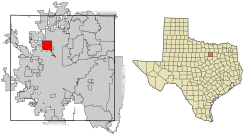Saginaw is a small city in Tarrant County, Texas, United States, and an Inner suburb of Fort Worth. The population was 23,890 in 2020 census. Saginaw is a Home rule municipality.
Saginaw, Texas | |
|---|---|
| City of Saginaw | |
 The Saginaw Chamber of Commerce in a former train station | |
| Motto(s): Train and Grain | |
 Location of Saginaw in Tarrant County, Texas | |
| Coordinates: 32°51′42″N 97°22′00″W / 32.86167°N 97.36667°W | |
| Country | |
| State | |
| County | |
| Government | |
| • Type | Council-Manager |
| Area | |
| • Total | 7.66 sq mi (19.82 km2) |
| • Land | 7.65 sq mi (19.82 km2) |
| • Water | 0.00 sq mi (0.01 km2) |
| Elevation | 732 ft (223 m) |
| Population (2020) | |
| • Total | 23,890 |
| • Density | 3,100/sq mi (1,200/km2) |
| Time zone | UTC-6 (CST) |
| • Summer (DST) | UTC-5 (CDT) |
| ZIP codes | 76131, 76179 |
| Area code | 817 |
| FIPS code | 48-64112[3] |
| GNIS feature ID | 2411754[2] |
| Website | City of Saginaw, Texas |
History
editThe town was renamed Saginaw in 1882 by Jarvis J. Green (after his first choice of "Pontiac" was rejected by the United States Postal Service), who had lived and worked on Saginaw Street in Pontiac, Michigan.[4] The name Saginaw comes from the Ojibwe language and means "to flow out." It is also the name of a river, a bay, and a city in Michigan.
On March 13, 1989, Evergreen International Airlines Flight 17 crashed near Saginaw, killing both pilots (the aircraft's only occupants) on board.[5]
Geography
editAccording to the United States Census Bureau, the city has a total area of 7.5 square miles (19.4 km2), all land.
Demographics
edit| Census | Pop. | Note | %± |
|---|---|---|---|
| 1950 | 561 | — | |
| 1960 | 1,001 | 78.4% | |
| 1970 | 2,382 | 138.0% | |
| 1980 | 5,736 | 140.8% | |
| 1990 | 8,551 | 49.1% | |
| 2000 | 12,374 | 44.7% | |
| 2010 | 19,806 | 60.1% | |
| 2020 | 23,890 | 20.6% | |
| U.S. Decennial Census[6] | |||
| Race | Number | Percentage |
|---|---|---|
| White (NH) | 13,026 | 54.52% |
| Black or African American (NH) | 1,656 | 6.93% |
| Native American or Alaska Native (NH) | 78 | 0.33% |
| Asian (NH) | 812 | 3.4% |
| Pacific Islander (NH) | 21 | 0.09% |
| Some Other Race (NH) | 97 | 0.41% |
| Mixed/Multi-Racial (NH) | 1,048 | 4.39% |
| Hispanic or Latino | 7,152 | 29.94% |
| Total | 23,890 |
As of the 2020 United States census, there were 23,890 people, 8,343 households, and 6,292 families residing in the city.
Economy
editTop employers
editSaginaw has two major railroad lines (one operated by Union Pacific and another by BNSF) running through the middle of the city, Rail-served heavy industry is located along these lines. Saginaw has a prominent heavy industrial base when compared to other suburban cities of the same size. Saginaw is known for its "Train & Grain" heritage, due to the presence of the railroads and two large flour mills located within the city limits. Large grain elevators (visible from miles away) are a prominent feature in the center of the city. According to Saginaw's 2018 Comprehensive Annual Financial Report,[10] the top employers in the city are:
| # | Employer | # of Employees | Percentage of Total |
|---|---|---|---|
| 1 | Eagle Mountain-Saginaw ISD | 2,541 | 30% |
| 2 | CTI Beanmaker&Chefco Foods | 440 | 5% |
| 3 | Ventura Foods | 398 | 5% |
| 4 | Walmart Supercenter #5316 | 393 | 5% |
| 5 | Trinity North Amer. Freight Car | 370 | 4% |
| 6 | Anchor Fabrication Corp. | 320 | 4% |
| 7 | BANA Incorporated | 247 | 3% |
| 8 | Texas Army National Guard | 245 | 3% |
| 9 | Ranger Fire Inc. | 200 | 2% |
| 10 | Russo Corporation | 200 | 2% |
Education
editNo colleges or universities are present in this small community, but the city lies within driving distance to Fort Worth and the rest of the Dallas/Fort Worth metropolitan area, which contains a number of colleges and universities including the Tarrant County College system.
Saginaw is served by the Eagle Mountain-Saginaw Independent School District. The four high schools in the district are Boswell High School, Saginaw High School, Chisholm Trail High School, and Watson High School/Alternative Discipline Center (the last of which is targeted to at-risk students.)
Notable people
edit- Brec Bassinger, actress
- Janet Gunn, actress
- Brad Hawpe, MLB Player
- Angela Stanford, LPGA Golfer
- Kirk Watson, politician[11]
Notes
editReferences
edit- ^ "2019 U.S. Gazetteer Files". United States Census Bureau. Retrieved August 7, 2020.
- ^ a b U.S. Geological Survey Geographic Names Information System: Saginaw, Texas
- ^ "U.S. Census website". United States Census Bureau. Retrieved January 31, 2008.
- ^ "Jarvis J. Green". www.waterfordmi.gov. Retrieved December 23, 2020.
- ^ "Aircraft Accident Report: Evergreen International Airlines, McDonnell Douglas DC-9-13F, N931F, Saginaw, Texas, March 18, 1989" (PDF). National Transportation Safety Board. April 23, 1990. NTSB/AAR-90/02. Retrieved December 23, 2020.
- ^ "Census of Population and Housing". Census.gov. Retrieved June 4, 2015.
- ^ "Explore Census Data". data.census.gov. Retrieved May 22, 2022.
- ^ https://www.census.gov/ [not specific enough to verify]
- ^ "About the Hispanic Population and its Origin". www.census.gov. Retrieved May 18, 2022.
- ^ City of Saginaw, Texas
- ^ "MEET KIRK". kirkwatson.com. Retrieved February 17, 2019.